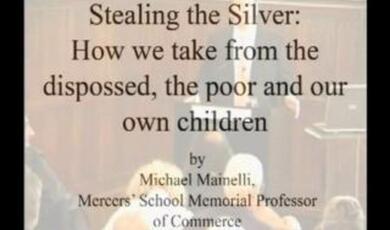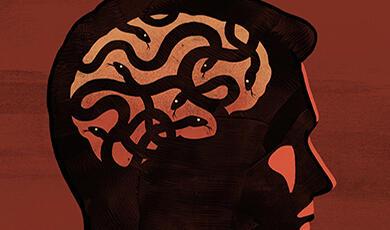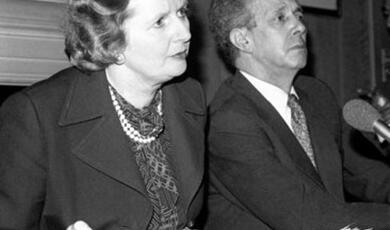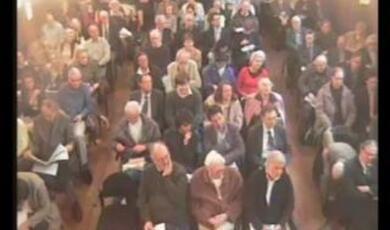What do rulers do when they rule?
Share
- Details
- Text
- Audio
- Downloads
- Extra Reading
Mark Twain commented that anyone who actively sought to become President was clearly thereby morally disqualified from holding the office. Why do people seek to govern, why do they do what they do when they govern, and how are we to explain and describe what they are doing?
Download Text
6 March 2007 WHAT DO RULERS DO WHEN THEY RULE?
Professor Rodney Barker
Mark Twain commented that anyone who actively sought to become President was clearly thereby morally disqualified from holding the office. Why do people seek to govern, why do they do what they do when they govern, and how are we to explain and describe what they are doing?
__________________________________________________________________________
*1 PICTURE
There is a world of rule, inhabited by men and women who construct meaning and justification for themselves as much as for those whom they lead or govern. Whether in democracies or autocratic states, they must believe themselves to be in key respect different from ordinary men and women. If they did not believe this, they would have taken other jobs, pursued other careers. They would be doctors or bus drivers, poets or postal workers. Mark Twain is alleged to have put it more cruelly when, if he ever did, he remarked that anyone who actively sought to be president of the United States was clearly thereby morally unfitted for holding the office
But the offices are filled, over the world and throughout history, and presumably by those who, in almost every case, actively sought to fill them. So what are we to make of this? What are rulers doing when they rule? How do they perceive what they are doing? And what are the consequences for the rest of us?
2. The limited use of general accounts
Any general set of statements about things are only any use in the long run if they help us understand particular things. There's no point in proving abstractly that pigs have wings if, on our particular farm, it seems to make no difference and the beasts refuse to fly.
So I want to take one recent example of what rulers do when they rule, see what light if any some of the things I've been saying over the last six months cast on it and, conversely, what support or lack of it the example casts on the general statements.
3. UK participation in the invasion of Iraq
In March 2003 the Prime Minister of the United Kingdom committed British troops to joining the American invasion of Iraq. Once the invasion was under way, the prime minister gained the support of the majority of the UK electorate for his support of the foreign policy of the Bush administration. But the change came with the invasion, as the public opinion figures switched almost exactly, from opposition to support.
4. Jekyll and Hyde, or Dr Tony and Mr Blair
from the representative hero of 1997 to the lone moral ranger of 2003
Before that, he was almost isolated, the very antithesis of the idea relation between a democratic leader and a democratic electorate.
Lancet editor Richard Horton was clear that his journal would be at the centre of debate about the whys and wherefores ofWestern intervention inIraq. "You can't treat war any differentlyfrom other risks to health," he told the BMJ.
The churches were against him
Public opinion was against him
A million demonstrators in central London
Articulate students on TV
The 20 impeccable ladies slow handclapping
Heckled in the Commons
The prime minister won a Commons Vote march 18th 2003 on resolution no moral justification without UN But
For: 217
Against: 396
Labour rebels: 139 out of 413 Labour MPs, of whom around 160 were in government, so over half the backbenchers opposed the government
Majority: 179
Ten resignations, most spectacular Robin Cook
5. Two immediate questions:
Why did Tony Blair do what he did?
How was Tony Blair able to do what he did?
6. Why did Blair do what he did?
1. Because he believed Iraq had a unique and threatening possession of biological, chemical, and nuclear weapons, which were likely to be used either directly by the Iraqi government or by irregular military groups, terrorists, to whom the Iraqi government would make these weapons available.
2. Because he believed that Iraq was a uniquely wicked regime which imposed a new, immediate, and unique moral obligation on other countries to intervene.
3. Because he believed the Saddam Hussein regime was uniquely the source of international terrorism, and that invading Iraq would be a significant means of ending or reducing such terrorism.
4. Because he believed that the existence of the Iraqi regime posed a unique threat to international stability in general, and the stability of the middle east in particular.
5. Because he believed that reliable supply of oil was essential for the well-being and even survival of industrial economies, and that the best or possibly only way to ensure this was to occupy the Iraqi oil fields.
6. Because he believed none of these things, but did believe that the USA under Bush was a dangerous element which needs moderating, and could not be directly checked
7. Because he believed that international society as we had known it since the end of the Second World War was at an end, and that it was in the interests of the UK to ally itself with the US Empire
8. Because the UK was so enmeshed, economically, diplomatically, militarily, and in terms of intelligence/espionage, with the USA, that independent action was impossible.
9. The lure of a grand role on the world stage self presentation. How to act like a world statesman
7. Do any of these convince?
It has to be said that none of these explanations is entirely convincing.
The public felt pretty much that, too:
ICM,1/4/03
Q4. Which, if any, of the following do you trust to tell people the truth about what is happening in Iraq?
Reporters covering the war
60%
Military chiefs
44%
Tony Blair
40%
President George. W. Bush
15%
The Iraqi regime
4%
None of them
18%
ICM Daily Mirror 4 April 2003
Q2. Putting aside how you yourself feel about the war, which one of the following reasons do you think best explains why the United States and Britain have launched it?
To stop Saddam using weapons of mass destruction
28%
To get rid of Saddam Hussein because he is evil
27%
So the United States can get control over Iraq's oil reserves
17%
In revenge for the attack on the World Trade Centre on September 11th, 2001
11%
So Iraq can become a democracy
10%
None of these
3%
Don't know
5%
8. Occam & Holmes to the rescue
But two reasoning devices help, one from medieval philosophy, the other from detective fiction. William of Occam proposed a form of reasoning which has become know as Occam's razor. All possible explanations or arguments are set down, and then the most complex is struck off, followed by the next most complex, until only one is left. Sherlock Holmes proposed a similar procedure to Dr Watson. 'When you have considered all possible explanations for the crime, and disposed of the least likely, the remaining explanation, however unlikely it may appear, is the correct one'
I'm not sure if we can make as strong a claim as that, but at least we can say it is best we can find for the moment, rather like Winston Churchill's defence of democracy as the worst system of government there was, apart from all the others.
9. A self-made man?
Had Blair, by the time of the preparation for invasion, which we now know to have been at least a year earlier, created himself in a way which made his support for the policy of the Bush government plausible, possible, or likely?
The cultivation of rule is necessarily a self-justifying exercise, and the paradoxes of rule in democracy draw attention to it in a unique way, but are otherwise normal, sharing this essential character with all rule.
Rulers must, however representative they may be, be unrepresentative. A truly representative citizen would be a citizen, not a ruler
10. Rulers and ordinary people
Any one in a position of national authority must be in several ways removed from what we think of as 'ordinary life' They will try frequently to give the impression to ordinary voters and citizens that this is not so, particularly if they are dependent on the opinions, and votes, of those citizens. But even if they are not another person entirely in the private world of Downing Street, or the Kremlin, or the White House, or the Elysée, or the Forbidden City, they will have a particular perception of a particular world which marks them off, not from each other, but from everyone else. That will give them insights into all kinds of information which the rest of us do not have. And it will lead them to use that information for what seem to them the best of reasons and purposes, whilst from time to time, and necessarily, concealing things from those whom they govern.
Virtuous rule is a characteristic of all systems, not just of despotisms, though democracies give the greatest opportunities, though never infallible ones, for checking and questioning it.
11. How was the Prime Minister able to commit the UK to joining the invasion of Iraq?
a. 18 years of one party government
b. 2 landslide election victories
c. A uniquely loyal parliamentary party which has misread the history of the conservatives, and has missed the point about public loyalty and private toughness
d. our boys and girls
e. are the British a deferential nation? Well not even the English are, but there is some standard patriotism after war has been (not) declared
b. Tactically:
a. normal propaganda
b. setting the agenda: the 'weapons of mass destruction' argument
a version of the 'so what are we going to do about it' argument, which precludes consideration of whether we need do anything, or whether the 'it' has a deserved place in a list of priorities. The rhetorical device, other words, of the urgent and immediate imperative
c. shifting the argument from representation to morality
d. From WMD to dictatorship to the US as international crimes arbiter, and the UN forgotten within weeks
12. Rulers are full time professionals, citizens are (mostly) amateurs
Rulers rule all the time, and have the resources and the initiative.
They have Weber's laws of small numbers and of secrecy on their side.
13. Rulers are different, and the more they rule, the more different they get
The power of the covenant. It is both necessary to rule, and a drug that makes it dangerous.
The difficulties of the virtuous ruler: Labouchere on playing cards with Gladstone.
Weber on the necessary secrecy of government.
Back to the beginning: the necessity to shout very loudly indeed, and the certainty that it will frequently have little effect.
Government is a necessary and inherent feature of human social life. But it works best when we make life difficult for our rulers. That does not ensure good government, or even prevent bad government. The best we can hope for is that it makes bad government more difficult.
©Professor Rodney Barker, Gresham College, 6 March 2007
GRESHAM COLLEGE
This event was on Tue, 06 Mar 2007
Support Gresham
Gresham College has offered an outstanding education to the public free of charge for over 400 years. Today, Gresham College plays an important role in fostering a love of learning and a greater understanding of ourselves and the world around us. Your donation will help to widen our reach and to broaden our audience, allowing more people to benefit from a high-quality education from some of the brightest minds.


 Login
Login







